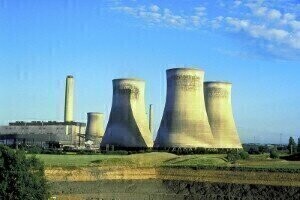Air Monitoring
What are the Air Quality Challenges Posed by Modern Coal-Fired Power Stations?
Mar 22 2023
Coal-fired power plants have long been associated with air quality challenges due to their emissions of particulate matter, sulphur dioxide (SO2), nitrogen oxides (NOx), mercury, and other hazardous pollutants. With advances in technology, modern coal-fired power stations have sought to reduce these emissions and mitigate their impact on air quality. This article provides a comprehensive overview of the air quality challenges produced by modern coal-fired power stations.
Over the years, coal-fired power plants have adopted advanced emission control technologies to address air quality concerns. Some of these technologies include:
- Electrostatic precipitators (ESPs) and fabric filters (baghouses) that capture and remove particulate matter from the flue gas.
- Flue gas desulfurization (FGD) systems that remove SO2 by converting it into gypsum or other useful by-products.
- Selective catalytic reduction (SCR) and selective non-catalytic reduction (SNCR) systems that reduce NOx emissions by converting them to nitrogen and water.
These technologies have significantly reduced emissions from modern coal-fired power plants. However, despite these advancements, several air quality challenges persist.
Fine particulate matter (PM2.5) emissions
While ESPs and baghouses are efficient in capturing larger particulate matter (PM10), they are less effective in capturing smaller particles, such as PM2.5. These fine particles can penetrate deep into the lungs and have been associated with various respiratory and cardiovascular health issues.
Incomplete pollutant removal
Emission control technologies, such as FGD and SCR, are not perfect and may still allow a certain percentage of pollutants to be released. The efficiency of these systems can also be affected by factors like operational conditions, maintenance practices, and the quality of the coal being burned.
Trace elements and heavy metals
Coal-fired power plants emit various trace elements and heavy metals, such as arsenic, chromium, cadmium, and mercury. While modern coal-fired power plants employ mercury control technologies like activated carbon injection (ACI), not all plants are equipped with these systems. Additionally, ACI may not be as effective in capturing other toxic metals. The
Greenhouse gas emissions
One of the most significant air quality challenges posed by coal-fired power plants is their greenhouse gas (GHG) emissions, particularly carbon dioxide (CO2). While carbon capture and storage (CCS) technology can potentially reduce CO2 emissions, it is not yet widely adopted due to high costs and technical complexities.
Secondary pollutants
The emission control technologies used in modern coal-fired power plants may inadvertently produce secondary pollutants. For example, FGD systems can generate wastewater containing high levels of pollutants, which, if not properly treated, can contaminate water sources. Similarly, SCR systems can produce ammonia slip, which can react with other pollutants in the atmosphere to form secondary particulate matter.
To mitigate the air quality challenges posed by modern coal-fired power plants, several strategies can be employed: Air monitoring specialists play a crucial role in identifying air quality issues and ensuring compliance with emission standards. Regular and accurate monitoring of emissions can help identify problems early and prompt corrective action. Investments in research and development for cleaner coal technologies, such as integrated gasification combined cycle (IGCC) and ultra-supercritical (USC) power plants, can result in lower emissions and improved air quality. These technologies can increase plant efficiency and reduce pollutant emissions.
Greater emphasis on the development and adoption of CCS technologies can help reduce CO2 emissions from coal-fired power plants. Incentives and regulatory frameworks should be in place to promote the widespread deployment of CCS. Phasing out coal-fired power generation in favour of cleaner, renewable energy sources like wind, solar, and hydroelectric power can significantly reduce air quality challenges. This transition will require a combination of policy support, financial incentives, and technological advancements. Tighter emission standards for coal-fired power plants can help reduce pollutant emissions and improve air quality. Effective enforcement of these standards, coupled with regular inspections and penalties for non-compliance, can ensure that power plants adhere to best practices. Increased public awareness about the environmental and health impacts of coal-fired power plants can create pressure on the industry to adopt cleaner technologies and practices. This awareness can also lead to greater support for the transition to alternative energy sources. Air quality challenges often transcend national borders, making international cooperation essential. By sharing best practices, technologies, and resources, countries can work together to address the air quality challenges posed by modern coal-fired power stations.
Despite advancements in emission control technologies, modern coal-fired power stations continue to pose air quality challenges. Air monitoring specialists play a vital role in identifying and addressing these challenges. A combination of strategies, including continuous monitoring, promoting cleaner coal technologies, transitioning to alternative energy sources, and strengthening emission standards and enforcement, can help mitigate these challenges and pave the way for a cleaner, healthier environment.
Digital Edition
AET 28.2 April/May 2024
May 2024
Business News - Teledyne Marine expands with the acquisition of Valeport - Signal partners with gas analysis experts in Korea Air Monitoring - Continuous Fine Particulate Emission Monitor...
View all digital editions
Events
Jul 30 2024 Jakarta, Indonesia
China Energy Summit & Exhibition
Jul 31 2024 Beijing, China
2024 Beijing International Coal & Mining Exhibition
Aug 07 2024 Beijing, China
IWA World Water Congress & Exhibition
Aug 11 2024 Toronto, Canada
Aug 25 2024 Stockholm, Sweden and online









.jpg)








